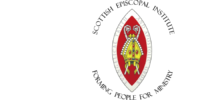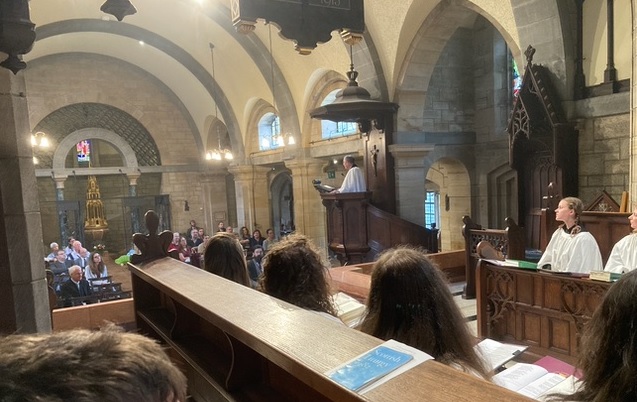On Friday 23 June, the Vigil of the Nativity of St John the Baptist, the Revd Dr Michael Hull offered an address during Evensong at All Saints’ Episcopal Church, St Andrews, at which the the Revd Canon Dr Alasdair Coles, the Rector, presided.
Canon Coles, in addition to his duties at All Saints’, is an Associate Tutor at the Scottish Episcopal Institute as well as an Honorary Lecturer at St Mary’s College, the School of Divinity of the University of St Andrews. The special Evensong coincided with the annual meeting of the European Academy of Religion at the University from 19 to 23 June.
Dr Hull’s address focussed on St John the Baptist’s proclamation of the truth. The full text of the address is as follows:
St John the Baptist, as you will know, is mentioned in all four Gospels and in the Acts of the Apostles, where both St Apollos and St Paul know of him. From the Holy Scriptures, then, we know a good deal about St John. In no particular order, for I know not how to order such things, we know John to be the son of a priest, a cousin of Jesus and a miracle baby. John is called a ‘forerunner’, ‘herald’, ‘prophet’ and ‘baptiser’. In fact, John has as many titles as churches that claim to have his head!
It is our Divine Lord who tells us that no woman born of man is greater than John (Matthew 11.11; Luke 7.28). Our Gospel passage for today’s Evensong (Luke 1.5–25) recounts the Annunciation to Zachariah, the Baptist’s Nativity, in tandem with the Annunciation to Mary and Jesus’s Nativity. The pericope solidly undergirds our Lord’s words about John in terms of John’s greatness.
I would submit to you today that John’s greatness is particularly evident in his proclamation of the truth.
You will recall that both St Luke (chapter 7) and St Matthew (chapter 11) narrate an imprisoned John sending his disciples to ask Jesus, ‘Are you he who is the one to come, or shall we look for another?’ It strikes me as an odd question on several levels, not least of which is that John is not asking another question, that is, ‘Why don’t you get over here, my mighty-miracle-making cousin, and get me out of this jail?’ Or, ‘Cousin, Jesus, don’t you remember you Father’s words in King David’s Psalm (61) about you? You remember, don’t you? “The Spirit of the Lord God is upon Me, because the Lord hath anointed Me to preach good tidings unto the meek. He hath sent me to bind up the broken hearted, to proclaim liberty to the captives, and the opening of the prison to them that are bound.” So, why not come now and bring me some liberty and open this prison for me’?
I do not know about you, but if I were in prison and had a connection like John’s to Jesus, I would not be sending my disciples with questions. I would skip interrogatives and get right to imperatives: ‘Lord Jesus, get me out of here!’ But John does not do that. John knows the truth. He is where he is supposed to be. John does not ask Jesus to get him out of prison or to save him for decollation. And Jesus does not offer those things to him. John, the ‘forerunner’ of Jesus, demonstrates what will befall his and our Lord: prison, suffering and murder. John manages to prophesy from a dungeon by sending his disciples to ask Jesus for the truth, which they will proclaim after hearing it from Jesus himself. That is what prophets do, you see, they do no seek to save themselves or to look good or to win friends and influence people or to have seats of honour in government. To the core of their being, they proclaim the truth. Again and again.
And Jesus gives John what he asks for in the very words of Holy Scripture. Jesus says, to the disciples, ‘Go and tell John what you have seen and heard: the blind receive their sight, the lame walk, lepers are cleansed, and the deaf hear, the dead are raised up, the poor have good news preached to them’ (Luke 7.22). Jesus uses the words of another prophet, Isaiah (35.5–6; 61.1) to give answer to his cousin, for John’s own birth was prophesied by Isaiah and John began his own ministry with Isaiah’s words (40.1–5, 9).
No doubt, John was satisfied in the deepest sense with the truth about himself and Jesus. Perhaps these words of the Lord and Isaiah were the words in John’s head as it was lopped off by an infamous figure like Herod Antipas, who, to borrow Hannah Arendt’s words, epitomised ‘the banality of evil’ in the first century.
We can only imagine the thoughts, though, running through our Lord’s mind. Jesus knows the truth. He knows John’s fate. He knows his own fate. His cousin, his playmate, the boy who danced in his Aunt Elizabeth’s womb on their first meeting is an innocent on death row. When Jesus went missing that Passover long ago, and Mary and Joseph looked for him among their kinsfolk in Jerusalem, surely Zachariah, Elizabeth and John were in that number. Imagine the scene in the Jerusalem Temple. Luke tells us that Mary, asks Jesus, ‘Son, why have you treated us so? Your father and I have been searching for you in great distress’ (Luke 2.48). I imagine in another corner the Temple, Elizabeth, perhaps less graciously than her cousin Mary, saying, ‘John, you’re always up to something, and usually with your cousin, Jesus! I don’t know what’s going to become of you two!’
Did Jesus weep then and there for John as he did for his friend Lazarus? One day we will know…
What we do know today is that John knew the truth, even if he wanted to hear it again from God the Son, and John knew that he was already free. John did not desire physical freedom or comfort. John knew exactly where he was and why he was there. He was in Herod Antipas’s dungeon at Machaerus, on theeastern side of the Dead Sea. John was there because he was speaking the truth about Antipas’s immorality. It is no wonder that today’s collect from the Book of Common Prayer should find us praying God ‘to make us so to follow his doctrine and holy life, that we may truly repent according to his preaching;
and after his example constantly speak the truth, boldly rebuke vice, and patiently suffer for the truth’s sake.’ Oh, that God would do that for you and me as he did for John the Baptist!
Antipas’s dungeon was the worst little corner of a desert John knew well. John was a prophet who knew first-hand how much speaking the truth costs. Vice was vice. Sin was sin. John would not accept the first-century spin. In the same way that he proclaimed, ‘Ecce, agnus Dei, ecce qui tollit peccata mundi’ (John 1.29), John also proclaimed that Phasaelis was Antipas’s wife, not Herodias. Salome’s dancing. Antipas’s dithering. The whole thing was an ugly farce, even if all parties were happy with their arrangement.
How else could John preach? How else could the second Elijah speak? For it is Jesus himself who tells us that John ‘is the Elijah who is to come’ (Matthew 11.14; Malachi 3.23). Even in patiently suffering for the truth’s sake in prison, John manages to proclaim Jesus through his disciples and the Holy Gospels relate that truth to you and me today.
John does not say ‘Get me out of here!’ John says, ‘Let me know!’ Tell me again! And you and I should ask the same of God the Son: ‘Let us know!’ ‘Tell us again!’ We should not accept the twenty-first century spin. It befalls us to witness along the lines of John’s witness: to denounce vice and sin, especially among the rich and the powerful within the church and outwith it.
The twentieth-first century spin, by my lights, includes thinking that it is only our role to say ‘Ecce, agnus Dei!’ Whilst that is perhaps the greatest truth that John proclaimed, it is not the only thing John said. We certainly do well to proclaim it. Yet, perhaps, when we do so within our churches, we do so only to people who agree with us. Have we become a church that in many ways only preaches to the choir? To a choir that, by every ostensible measure, is thinning and thinning because the proclamation of selected truths, even ones so important as this, has fallen into a veiled self-affirmative screech because other truths are discounted?
John, it seems, did not lose his head because of his doctrinal teaching, per se, but because of his ethical teaching. John’s clear and consistent voice about the moral order was not welcome in the first century. Sadly, we see that the church today, as it has so often done in the late twentieth and early twenty-first century, waters down its doctrine to a Rogerian non-alcoholic cocktail and tests its ethics by dipping a toe into politically correct waters. That pool is as treacherous in the twenty-first century as it was in the first. Angels, at least good ones, are not stirring up those waters!
If we would worthily celebrate John’s Nativity, we need worthily celebrate his life, his suffering and his death, all of which are predicated on his devotion to preaching the truth and to denouncing vice and sin, particularly in the highest echelons of society. That is what prophets do, you see, they do not seek to save themselves or to look good or to win friends and influence people or to have seats of honour in government. They do not tolerate, never mind join in the banality of evil. And neither should we!
Today is an opportunity to begin to imitate John the Baptist the prophet, forerunner and herald in speaking clearly and forthrightly the truths of God, both about doctrine and morals, to the extent that we risk imprisonment, suffering—maybe even death. After all, the very worst that could happen is that we too lose our earthly heads, only to find our immortal lives in the beatific vision wherein we shall join with John and the saints to proclaim in all truth for all time: ‘Ecce, agnus Dei!’
Photo courtesy of Alasdair Coles


